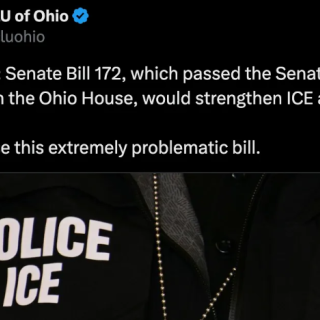The City Council race in Columbus is shaping up to be an interesting one. Yes We Can candidates Jasmine Ayres and Will Petrik are running on progressive platforms that include affordable housing, policing reform, renewable energy, and a living wage. Beyond a few token initiatives, the current City Council only pays lip service to these concerns. As Berniecrats, Petrik and Ayres intend to push hard for real reforms.
It remains to be seen whether Left Democrats will be able to win seats on City Council without the corporate campaign backing enjoyed by the three candidates endorsed by the Franklin County Democratic Party. If Ayres and Petrik do manage to get elected in November, it remains to be seen whether they will be able to reform the local political machine from the inside. The FCDP establishment holds the levers of power in the party, and they have made it clear that they like things as they are. They will resist to the death any changes that displease their corporate sponsors.
Meanwhile, the radical left is pursuing a very different political strategy in Minneapolis. Ginger Jentzen of Socialist Alternative has no illusions about reforming the Democratic Party. She is running as an independent socialist for the Ward 3 City Council seat. As executive director of 15 Now Minnesota, Jentzen had a leading role in the grassroots movement to win a $15/hour minimum wage in Minneapolis, which succeeded in spite of fierce opposition from Democrats on City Council.
A key element in Jentzen’s platform is affordable housing. Ward 3 includes the U.S. Bank stadium, which was funded by taxpayer dollars. There is no such public assistance for people of color and students, who are being driven out of Ward 3 by skyrocketing rents pushed by housing developers.
Jentzen supports rent control, and taxes on big developers to finance affordable housing. Taking a cue from Kshama Sawant in Seattle, Jentzen has pledged to refuse any campaign contributions from housing developers and corporate interests. Her Democratic opponent in Ward 3, Steve Fletcher, has made no such pledge. At a recent candidate forum, Fletcher said that the city should “make life easier for developers.”
By July 30, Jentzen’s campaign brought in over $60,000 in small individual donations (a la Bernie Sanders), three times as much as Fletcher’s campaign. But corporate cash has been flowing to Fletcher since then. Big developers will try to buy the election in Ward 3. “You cannot be taking money from big developers and say that you will be able to just easily vote against their interests,” Jentzen said in an interview with Jacobin magazine.
Besides corporate donations, another corrupting influence in city politics is the high salary that city council positions bring in. Wealth changes the consciousness of political figures, putting them out of touch with the interests of the people they have pledged to represent. As Kshama Sawant has done in Seattle, Ginger Jentzen has pledged to take home only the pay of an average skilled worker in Minneapolis, donating the balance of her City Council salary to progressive movements.
Jentzen is endorsed locally by the Communications Workers of America, Minnesota Nurses Association, and Socialist Action. Nationally, she is endorsed by Democratic Socialists of America and the International Socialist Organization.
Why does the Minneapolis election matter in central Ohio? The outcome could be a bellwether for the political future of Columbus. In Seattle, Kshama Sawant is the first independent socialist in decades to be elected (and re-elected) in a major U.S. city. This could be explained away as a result of Seattle being a “progressive” West Coast city. But if Jentzen wins a City Council seat in Minneapolis, it will demonstrate that a socialist can be elected in a Midwestern city, like Columbus.
Green Party candidate Samantha Pree-Stinson is also running for the Ward 3 City Council seat in Minneapolis. Her platform has many progressive elements, but she describes her politics as “Not left, not right, but forward.” Pree-Stinson doesn’t view politics in terms of a class struggle: “You cannot be anti business and pro worker. Us vs. them, workers against business, is damaging and fragmenting our community.”
Can real change for working people come from within the Democratic Party? The impetus for a $15 minimum wage in Seattle and Minneapolis did not come from the Democrats. It came from an independent movement on the far left. Democrats in Seattle and Minneapolis resisted $15 until the political pressure from outside the party became too great. Now, of course, they all say they support $15, because it is politically unviable to oppose it.
The Franklin County Democratic Party has a history of quashing dissent from within. They may respond better to political pressure from outside.
Transforming the political landscape in Columbus will require long-term vision. An investment in the Minneapolis City Council race is an investment in our city’s future. To donate to Ginger Jentzen’s campaign, go to gingerjentzen.org. To donate to Samantha Pree-Stinson’s campaign, visit preefor3.ruck.us.




